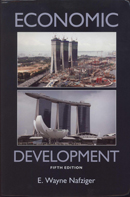April 25, 2012
University distinguished professor of economics publishes book
Submitted by E. Wayne Nafziger

E. Wayne Nafziger, university distinguished professor of economics, has just published the fifth edition of the textbook "Economic Development" with Cambridge University Press.
Nafziger has authored 14 books, including two with co-authors; co-edited six books; and published numerous journal articles in economic growth and income distribution. The focus of Nafziger’s publications is on the low- and middle-income economies of Asia, Africa, Latin America and East-Central Europe, where 85 percent of the world’s population lives, as well as analyses of the lessons of Japan’s long-term growth from the 1860s through the 1980s, and recent advances by South Korea and Singapore, for contemporary developing countries.
His articles have appeared in the American Economic Review, Economic Development and Cultural Change, World Development, Journal of Development Studies, Journal of Conflict Resolution, Economics of Peace and Security Journal, Defence and Peace Economics, Journal of Economic Issues and others.
Nafziger’s text explains the reasons for the fast growth of Pacific Rim countries such as China and Indonesia, and other economies such as Brazil, Poland and, recently, India, as well as the increasing degradation of large parts of sub-Saharan Africa. His comprehensive and clearly written text discusses poverty, income inequality, hunger, unemployment, stabilization and liberalization, the environment and carbon-dioxide emissions, the development of human capital, and the widening gap between rich – including middle-income – and poor countries.
According to Nafziger, the field of development economics has changed dramatically since his first edition in 1984: Countries such as India, Pakistan, Taiwan, and the Philippines were considered as poor then, but are now classified as middle-income countries. Moreover, the development literature now includes topics such as randomized experiments to assess aid, an exploration of whether information technology and mobile phones can provide poor countries with a shortcut to prosperity, and a discussion of how worldwide financial crises, debt, and trade and capital markets affect developing countries.
The book has been praised by other scholars in the field. John Weeks, School of Oriental and African Studies, University of London, said, “Now in its fifth edition, Nafziger’s 'Economic Development' had gone from the best in the field to the classic in the field, the most comprehensive statement and analysis of major issues of development. It is essential for students in both economics and development studies, and an invaluable aid to instructors. Indeed, every person who wishes to be well-informed about the inequalities among countries should read the third chapter, 'Economic Development in Historical Perspective'.”
Lloyd J. Dumas, University of Texas at Dallas indicates that: “The latest edition of this first-rate text updates the copious illustrative data contained in its clear and extraordinarily comprehensive treatment of the character and problems of development. . . .It is filled with valuable references to the literature and helpful websites that serve as a guide for deeper investigation of the key issues.”
For Howard Stein, University of Michigan, Ann Arbor, “Professor Nafziger’s Economic Development is one of few texts that draw on theory, history, policy, and institutional analysis of the complexity of the development process and why the goals of development continue to remain so elusive for so many.”
Christopher Cramer, SOAS, University of London, says that: “Rather than applying a body of theory to the problems of developing economies, this is a textbook that begins from the diverse, uneven reality of developing countries and explores how economics have been applied, what debates have emerged, and what policy relevance these debates have. Clearly written and briskly paced, its particular value emerges by using the text in combination with the Internet resources and bibliographic support the book provides.” John Loxley, University of Manitoba, thinks Economic Development is the most comprehensive text available on the subject, . . . written in a clear, lively, and readable fashion that makes it very accessible to students. It deals impressively with theory, policy, and institutional issues in the best traditions of political economy and draws intelligently on concrete country studies.”
Anwar Shaikh, New School for Social Research, New York, writes that Nafziger’s book is “An excellent and wide-ranging textbook on development. The author’s expertise and fair-mindedness are evident.”
Nafziger has been a faculty member in economics at Kansas State University since 1966. He received his bachelor’s degree from Goshen College, his master’s from the University of Michigan, and his doctorate from the University of Illinois in 1967. He was Visiting Fulbright Professor at Andhra University, India in 1970-71; Fellow at the East-West Center, Honolulu in 1972-73; Visiting Scholar, University of Cambridge; and Visiting Scholar, Nigerian Institute for Social and Economic Research, Ibadan, 1976; Visiting Professor, International University of Japan, Graduate School of International Relations, Yamato-machi, in 1983; Hewlett Fellow at the Carter Center, Atlanta, in 1991; Indo-American Foundation and National Science Foundation researcher at Andhra University in 1993; Senior Research Fellow at the UNU/World Institute for Development Economics Research, Helsinki, 1996-1998; and American Institute for Indian Studies and Institute for Social and Economic Change, Bangalore Researcher on “Bangalore Software Entrepreneurs under Reform,” 2007. He was editor of the Journal of African Development in 2008-11. He has supervised 22 completed Ph.D. dissertations (3 co-major chair). Nafziger has been Co-Principal Investigator, African Studies Center and other centers at KSU.
He was married for 41 years to Elfrieda Toews, who died in 2007. He has two sons, Brian, a U.S. State Department foreign service officer, serving in Moscow, Russia, and Kevin, Southwest Bureau Chief for Pearson’s MergerMarkets, in Phoenix.
Instructors wishing to consider the 5th edition of Economic Development, 2012, may contact Cambridge University Press for a complimentary copy, and nafwayne@ksu.edu for test banks and supplements.
